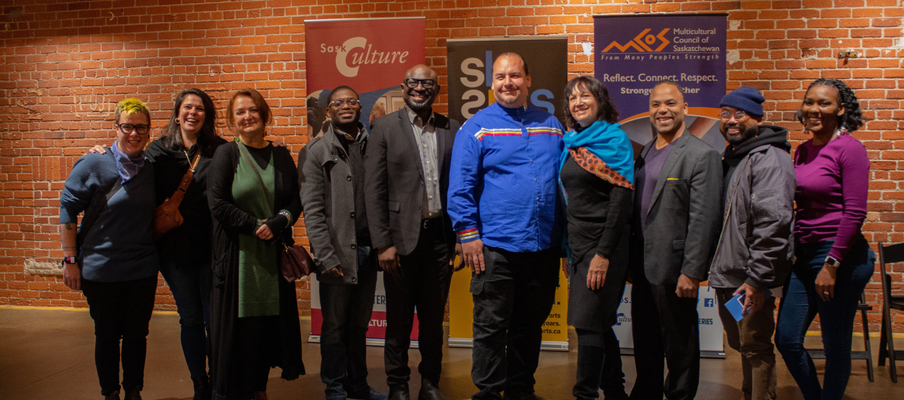Deeper understanding of different value-based needs, key to funding renewal

Learning how to connect to a greater diversity of people and perspectives is key to building a better funding model that will be sustainable into the future.
This past year, SaskCulture continued to move forward on the multi-year Funding Program Renewal Project, designed to ensure that dollars from the Culture Section of Sask Lotteries Trust Fund are used to benefit the people in Saskatchewan. In particular, the renewal process is focused on supporting Inclusion, Diversity, Equity and Accessibility (IDEA), advancing Truth and Reconciliation, establishing value-based evaluation and helping to ensure the sustainability of Saskatchewan’s cultural sector.
“We spent the year learning more about the impact of current funding and exploring some of the barriers to funding that need to be addressed,” says Dean Kush, CEO, SaskCulture. “At this point, we are continuing to improve our understanding of value-based evaluation options, more participatory granting processes, the challenges faced by equity-deserving groups, as well as identifying objectives for future research and consultation.”
The work over the past year included small pilot studies, performed by Reciprocal Consulting, from April to June 2023, which identified stakeholder feedback on evaluation tools, contributing to a wider framework that could be used to measure progress on inclusion, diversity, equity and accessibility, as a result of funding support. The process included a focus group and surveys of grantees, members, staff members and volunteers.
According to Catherine Folstad, Supervisor, Granting and Technology, “The results of the pilots helped us better understand the tools needed to assess stakeholder awareness and alignment with IDEA and Truth and Reconciliation in their programming, services and decision making.” The pilots helped refine questions that can be used to collect input on funding program delivery, identify ways to improve delivery processes, learn more about equitable funding practices, including barriers and enablers, as well as measuring the Board and staff’s support for change going forward.
SaskCulture recognizes the importance of helping the community learn and implement value-based evaluation practices. The Reciprocal report outlined the value of this type of data collection and analysis, as well as key policies that can be used by SaskCulture and others to ensure evaluation practices are ethical, safe, consistent and less of a burden.
“By identifying and focusing on values, we can facilitate a way for SaskCulture and potential grant recipients to communicate about a funding program’s goals and intentions, provide a critical lens for interpreting outcomes and impacts, help establish value-based measurements and ensure the program is adaptable to changing circumstances,” says Folstad.
Folstad also noted that, evaluation data can be used to track the impact of the funding system, as well as to help advocate for necessary changes required to address the needs of the people in Saskatchewan.
Kush adds that SaskCulture’s Funding Program Renewal Project also benefited from working with SK Arts on the Share and Connect and the Building Arts Equity: BPOC grant programs over the last year. “For both of these grants, we were able to explore and learn from the hands-on process of using participatory grant-making to become more responsive to the needs of equity-deserving groups,” he says. “It’s been a positive experience seeing community members be actively involved in the development and implementation of a grant program designed to meet their needs.”
As part of its learning process, SaskCulture commissioned two reports designed to identify practices that help engage and support cultural engagement and access for people with disabilities and 2SLGBTQIA+ communities. Folstad notes that, “Each of these groups face different barriers to accessing cultural funding and these reports are helping us get a better understanding of some of the systemic issues, challenges, as well as funding delivery options already in use by other funding bodies.”
Kush adds that much of the work in 2024 will focus on consulting with the wider cultural community. Over the past year, SaskCulture made progress on identifying its research objectives and establishing preliminary consultation plans. “It’s time to take some of what we have learned out to the community to get their input,” he says. “Community input, particularly from equity-deserving groups, will help us in identifying the key changes that need to take place to support an inclusive, diverse, equitable and accessible funding delivery system going forward.”

